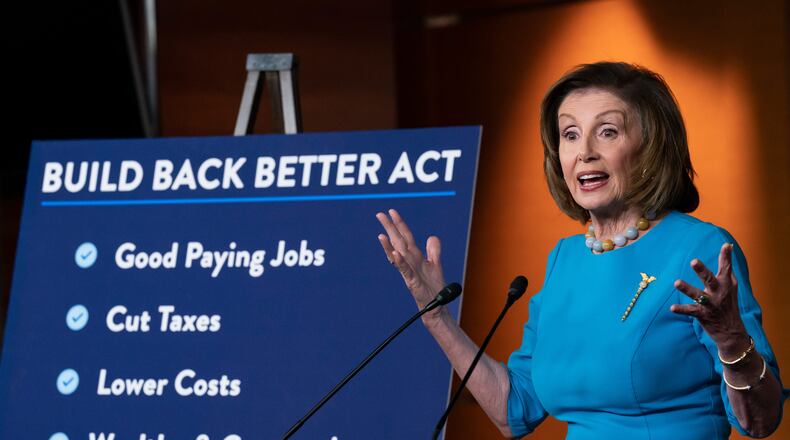A new piece of federal legislation could lower taxes, provide childcare subsidies and expand Section 8 vouchers in Savannah if it passes the U.S. Senate.
The Build Back Better Act is one of Pres. Joe Biden's first-year tentpoles. It's a $1.75 trillion social spending bill funded by taxes on wealthy Americans and corporations. Households making less than $400,000 a year won't be impacted by the tax hikes implemented for the bill's funding, according to the Democratic Party of Georgia.
According a Nov. 18 statement released by the nonpartisan Congressional Budget Office, the "CBO estimates that enacting this legislation would result in a net increase in the deficit totaling $367 billion over the 2022-2031 period, not counting any additional revenue that may be generated by additional funding for tax enforcement."
Credit: ASSOCIATED PRESS FILE
Credit: ASSOCIATED PRESS FILE
The bill passed in the House on Nov. 19 and awaits a vote in the Senate, where it could be quashed by Republican senators. The bill might see some changes in the Senate (the House version includes paid parental leave funds, the Senate version does not), but here's a look at how the trillion-dollar bill could distribute dollars and resources here in Georgia, based off federal funding formulas:
Education
- Childcare: The White House estimates a family with two children spend 8% of their income on childcare in Georgia, which is about $7,500 per child. To ease the burden of daycare, the BBB Act includes funds to ensure households that earn less than $200,500 a year will spend no more than 7% of their annual income on childcare. According to federal funding formulas, this would impact about 90% of young children in Georgia.
- Preschool: Two-thirds of toddlers (3-4 years) in Georgia don't have access to public preschool. The BBB Act would increase funding to expand preschool for an estimated 183,000 children to attend preschool for free.
- Higher education: Nearly 200,000 students in Georgia rely on the Pell Grant, a federal grant for low-income students to attend college. Under the BBB Act, college students in Georgia who receive the Pell Grant could earn up to $550 more per year for their schooling. Additional funding will be made available for students of Historically Black Colleges and Universities in the state.
- School lunches: The BBB Act includes millions in funding for Georgia school districts to expand free lunch for 148,000 students. The money will also provide support for about one million students experiencing food insecurity to purchase meals over the summer.
Credit: Anna Moneymaker, Getty Images
Credit: Anna Moneymaker, Getty Images
Jobs
- Climate Change: The legislation aims to combat climate change and the financial strain of severe weather events with a broad range of actions. The bill includes $30 billion to create a Climate Corps, modeled after the Great Depression-era Civilian Conservation Corps, which put unemployed citizens to work on infrastructure, arts and public service projects. Activists want the Climate Corps to pay $15 an hour, provide health insurance and target young people of color.
- Workforce Development: More than $1 billion nationwide will go to expanding workforce development programs in schools and community colleges. In Georgia, 32 colleges would be eligible for grants to establish job programs in IT, green energy, child care, manufacturing and more, according to the White House.
- Solar energy: Sen. Jon Ossoff, D-GA, added priorities for solar energy infrastructure in the bill, including companion legislation that would incentivize the solar energy manufacturing supply chain, so the U.S. becomes a major producer of solar energy and the facilities and materials it requires.
Credit: ANDREW CABALLERO-REYNOLDS, AFP via Getty Images
Credit: ANDREW CABALLERO-REYNOLDS, AFP via Getty Images
Housing
- Affordable housing: There is more than $100 billion in the bill to expand Section 8 housing vouchers, and a commitment to build 1 million units of affordable housing nationwide. Georgia's allotment of those resources has yet to be decided, but based off past federal funding formulas, the state could receive money to provide 9,700 more vouchers statewide. In Savannah, 7,000 people remain on a waiting list for housing vouchers, which has not reopened since 2014.
Healthcare
- Health care expansions: Biden's administration believes health care should be a right, not a privilege. To support this, the BBB Act includes funds to expand Medicare and Medicaid coverage to more than 500,000 Georgians. Investments in pandemic preparedness and mental health resources will be also be made on a state-by-state basis.
Taxes
- Tax cuts for the low- and middle-class: Low-wage workers (about half-a-million workers in Georgia) will receive an additional tax exemption for up to $1,500
- Child Tax Credit: The pandemic-driven Child Tax Credit will be extended through the BBB Act. The credit gives "$300/month per child under 6 or $250/month per child ages 6 to 17," according to the White House's factsheet.
Zoe covers growth and how it impacts communities in the Savannah area. Find her at znicholson@gannett.com, @zoenicholson_ on Twitter, and @zoenicholsonreporter on Instagram.
This article originally appeared on Savannah Morning News: What is the Build Back Better Act, and what's in it for Georgia?
The Latest
Featured




